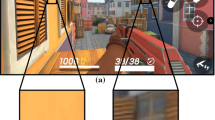Abstract
Audio-visual interactive content is very common nowadays. It has many applications in very different fields, from videogames to visualization of scientific data. However, there are environments such as digital television in which the delivery of interactive content is of interest, but are limited by the shortcomings of the players. For example, in cable TV environments users access content through a set-top box, which is usually very limited in computing power due to cost, power consumption and the need to keep a moderate size. Furthermore, set-top boxes do not usually have specific hardware for graphics processing (GPU, Graphics Processing Unit) desirable for high quality interactive content, but rather are optimized for real time decoding of video in hardware (usually Mpeg-2, in very recent ones h.264). In this work we describe a distributed system for the creation of synthetic content and its encoding to digital video to send it to the clients. The most important features to provide are scalability and fault tolerance, in order to support a large number of concurrent users with an uninterrupted service.
Partially Supported by Partially supported by Xunta de Galicia PGIDIT07TIC005105PR and MEC TIN2005-08986.
Preview
Unable to display preview. Download preview PDF.
Similar content being viewed by others
References
Armstrong, J.: Programming Erlang: Software for a Concurrent World. Pragmatic Bookshelf (2007)
Gulias, V.M., Barreiro, M., Freire, J.L.: Vodka: Developing a video-on-demand server using distributed functional programming. J. Funct. Program 15(3), 403–430 (2005)
Paris, J., Gulias, V.M., Valderruten, A.: Developing a functional tcp/ip stack oriented towards tcp connection replication. In: Proceedings of the 2005 IFIP/ACM Latin American Networking Conference (2005)
Thompson, C.J., Hahn, S., Oskin, M.: Using modern graphics architectures for general-purpose computing: a framework and analysis. In: MICRO 35: Proceedings of the 35th annual ACM/IEEE international symposium on Microarchitecture, pp. 306–317. IEEE Computer Society Press, Los Alamitos (2002)
Author information
Authors and Affiliations
Editor information
Editors and Affiliations
Rights and permissions
Copyright information
© 2009 Springer-Verlag Berlin Heidelberg
About this paper
Cite this paper
Paris, J., Gulías, V., Abalde, C. (2009). A Distributed System for Massive Generation of Synthetic Video Using GPUs. In: Moreno-Díaz, R., Pichler, F., Quesada-Arencibia, A. (eds) Computer Aided Systems Theory - EUROCAST 2009. EUROCAST 2009. Lecture Notes in Computer Science, vol 5717. Springer, Berlin, Heidelberg. https://doi.org/10.1007/978-3-642-04772-5_32
Download citation
DOI: https://doi.org/10.1007/978-3-642-04772-5_32
Publisher Name: Springer, Berlin, Heidelberg
Print ISBN: 978-3-642-04771-8
Online ISBN: 978-3-642-04772-5
eBook Packages: Computer ScienceComputer Science (R0)




